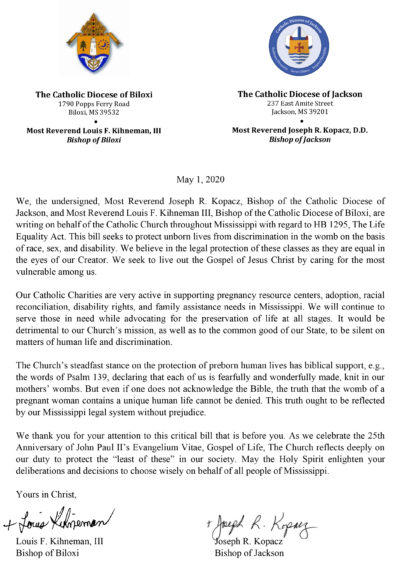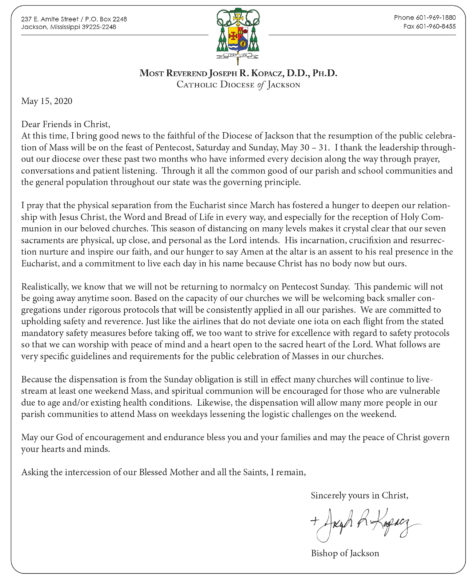La Misa Crismal confirma mejor que la iglesia,
el Cuerpo de Cristo, es el sacramento de salvación para el mundo cuando la unción del Espíritu Santo capacita a todos los bautizados para vivir su
vocación como colaboradores en la viña del Señor.
Por Obispo Joseph Kopacz
Al comienzo de esta semana, se celebró la Misa Crismal, en la Catedral de San Pedro Apóstol, aproximadamente dos meses después de la Semana Santa.
La mayoría de nuestras más preciadas tradiciones han sido alteradas radicalmente, pospuestas o canceladas a raíz de la pandemia mundial. En lugar de una Catedral llena de personas, representando a todos los rincones de la Diócesis de Jackson, solo asistieron entre 50 y 60 sacerdotes, según lo permiten las limitaciones del distanciamiento social.
Fue una reunión menos festiva, pero la realidad de quiénes somos nunca puede verse disminuida porque Jesucristo es el mismo ayer, hoy y siempre. El Prefacio de la Misa Crismal proclama claramente nuestra identidad, establecida a través de la fe, el bautismo y el camino de aquellos llamados al Orden Sagrado.
“Porque por la unción del Espíritu Santo hiciste a tu Hijo unigénito como Sumo Sacerdote del nuevo y eterno pacto, y por tu maravilloso diseño te complació decretar que su único Sacerdocio debía continuar en la iglesia. Porque Cristo no solo adorna con un sacerdocio real a las personas que ha hecho suyas, sino con la amabilidad de un hermano, también elige a los hombres para que participen en su ministerio sagrado mediante la imposición de manos. Deben renovar en su nombre el sacrificio de la redención humana, poner delante de sus hijos el banquete pascual, guiar a su pueblo santo en la caridad, nutrirlos con la palabra y fortalecerlos con los sacramentos. Al renunciar a sus vidas por usted y por la salvación de sus hermanos y hermanas, se esfuerzan por ser conformados a la imagen del mismo Cristo y ofrecerle un testimonio constante de fe y amor.”
La primera carta de Pedro en el Nuevo Testamento declara esta elevada imagen para aquellos que son miembros del Cuerpo de Cristo. “Pero ustedes son una familia escogida, un sacerdocio al servicio del rey, una nación santa, un pueblo adquirido por Dios. Y esto es así para que anuncien las obras maravillosas de Dios, el cual los llamó a salir de la oscuridad para entrar en su luz maravillosa.” (1 Pedro 2:9)
Junto con la renovación de los votos sacerdotales y la oración de aprobación de todos los presentes, físicamente y en espíritu, la bendición del Aceite de los Catecúmenos, el Aceite de los Enfermos y la consagración del Aceite del Crisma ocurre en el santuario. Los sacramentos del Bautismo, la Confirmación, las Órdenes sagradas y la Unción de los enfermos capacitan a los fieles cristianos para abrazar el estilo de vida que comenzó con Jesús el Cristo, el “Ungido”, el que es el Camino, Verdad y Vida.
La Misa Crismal confirma que la iglesia, el Cuerpo de Cristo, es el sacramento de salvación para el mundo cuando la unción del Espíritu Santo capacita a todos los bautizados para vivir su vocación como colaboradores en la viña del Señor.
En los últimos tres meses, ha existido una considerable colaboración y comunicación para tomar las mejores decisiones con respecto a las reuniones públicas, en nombre del bien común. Hubo llamadas semanales, en conferencia, y conversaciones diarias que pusieron en acción la unidad que es celebrada en la Misa Crismal.
Del mismo modo, el principio de subsidiariedad dio forma a lo que debería o podría hacerse a nivel local y estatal para la reapertura progresiva y por extensión a lo largo de las parroquias de nuestra diócesis. La subsidiariedad se manifestó cuando todos los asistentes a la Misa Crismal regresaron a sus hogares y ministerios con los Aceites Sagrados en la mano, para servir al Pueblo de Dios por otro año, esta vez en circunstancias particulares.
Aunque nuestra Misa Crismal fue restringida este año por un tsunami viral de una vez en un siglo, vi una Catedral llena a tope de una nube de testigos de toda la Diócesis, con quienes estábamos unidos en oración y propósito.
Agradezco a todos los líderes de nuestra diócesis, ordenados y laicos, que han redoblado sus esfuerzos en estos tiempos preocupantes para servir al Señor de maneras inesperadas.
Les pido sus oraciones por nuestros sacerdotes, jóvenes y mayores, que, como ustedes, sienten el dolor de la separación de las personas que aman.
Finalmente, compartan mi alegría con la próxima celebración de las Sagradas Órdenes el próximo 27 de junio, cuando ungiré al Diácono César Sánchez y al Diácono Andrew Nguyen con el Aceite del Crisma, para el comienzo de su respectivo sacerdocio en la Diócesis de Jackson.




